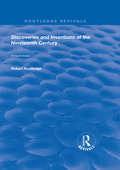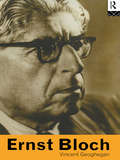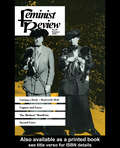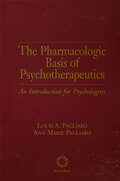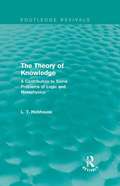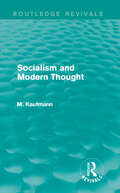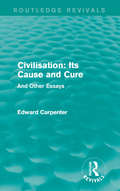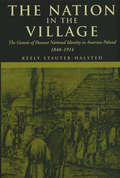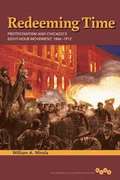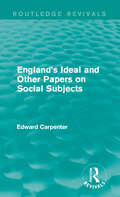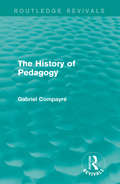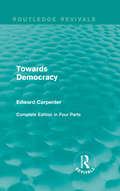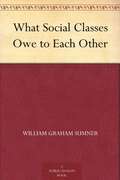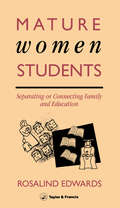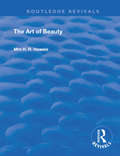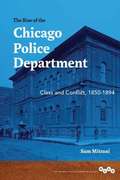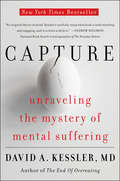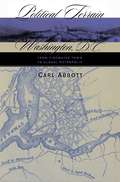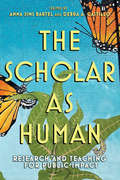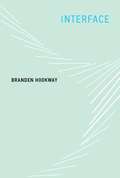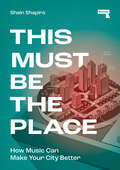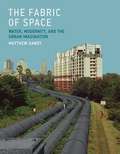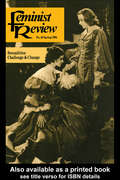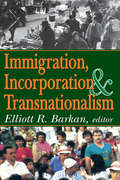- Table View
- List View
Discoveries and Inventions of the Ninteenth Century (Routledge Revivals)
by Robert RoutledgePublished in 1900. From Atoms to Warships and everything in between, Robert Routledge lists a vast and varied illustrated collection of the revolutionary advances in engineering and pioneering discoveries of the 19th century.
Ernst Bloch
by Vincent GeogheganErnst Bloch is perhaps best known for his subtle and imaginative investigation of utopias and utopianism, but his work also provides a comprehensive and insightful analysis of western culture, politics and society. Yet, because he has not been one of easiest of writers to read his full contribution has not been widely acknowledged. Block developed a complex conceptual framework, and presented this in a prose style which many have found to verge on the impenetrable. In this critical and accessible introduction to one of the most fascinating thinkers of the twentieth century, Vincent Geoghegan unravels much of the mystery of the man and his ideas.
Feminist Review: Issue 35
by The Feminist The Feminist Review CollectiveThis issue will cover the wide range of topics for which the journal is known and on which it has built its readership, rather than being a thematic issue.
The Pharmacologic Basis of Psychotherapeutics: An Introduction For Psychologists
by Louis A. Pagliaro Ann M. PagliaroFirst published in 1998. Routledge is an imprint of Taylor & Francis, an informa company.
The Theory of Knowledge: A Contribution to Some Problems of Logic and Metaphysics (Routledge Revivals)
by L. T. HobhouseL. T. Hobhouse (1864-1929) was fundamental to the New Liberal movement of the late nineteenth and early twentieth century. He authored many important works in the fields of philosophy, economics and social liberalism. First published in 1896, The Theory of Knowledge considers the content and validity of knowledge, and the conditions on which our understanding of knowledge is based. It is a rich and important classic, which remains of value to students and academics with an interest in sociology, anthropology and the philosophy of logic.
Socialism and Modern Thought (Routledge Revivals)
by M. KaufmannOriginally published in 1895, this title provides fascinating insights into the development of socialism in the decades prior to the explosion of 20th century socialist revolutions. Kaufmann examines the influences of Christian ideas and European society on socialism to give a fuller picture of the movement at the turn of the century as well as offers his predictions for the future of socialism in Europe. This title is ideal for students of sociology and history, particularly students interested in the development of modern intellectual movements.
Civilisation: And Other Essays (Routledge Revivals: The Collected Works of Edward Carpenter)
by Edward CarpenterThis volume, originally published in 1889 with this edition published in 1912, contains Carpenter's famous essays on civilisation and his theory that it is a disease of mankind that must be cured. Papers included in this collection discuss the rampant ill-health suffered by society as well as criticisms of modern science to support this theory whilst also analysing what the future holds for science, ideas of morality and traditions and customs. This title will be of interest to students of sociology.
The Nation in the Village: The Genesis of Peasant National Identity in Austrian Poland, 1848–1914
by Keely Stauter-HalstedHow do peasants come to think of themselves as members of a nation? The widely accepted argument is that national sentiment originates among intellectuals or urban middle classes, then "trickles down" to the working class and peasants. Keely Stauter-Halsted argues that such models overlook the independent contribution of peasant societies. She explores the complex case of the Polish peasants of Austrian Galicia, from the 1848 emancipation of the serfs to the eve of the First World War. In the years immediately after emancipation, Polish-speaking peasants were more apt to identify with the Austrian Emperor and the Catholic Church than with their Polish lords or the middle classes of the Galician capital, Cracow. Yet by the end of the century, Polish-speaking peasants would cheer, "Long live Poland" and celebrate the centennial of the peasant-fueled insurrection in defense of Polish independence. The explanation for this shift, Stauter-Halsted says, is the symbiosis that developed between peasant elites and upper-class reformers. She reconstructs this difficult, halting process, paying particular attention to public life and conflicts within the rural communities themselves. The author's approach is at once comparative and interdisciplinary, drawing from literature on national identity formation in Latin America, China, and Western Europe. The Nation in the Village combines anthropology, sociology, and literary criticism with economic, social, cultural, and political history.
Redeeming Time: Protestantism and Chicago's Eight-Hour Movement, 1866-1912
by William A. MirolaDuring the struggle for the eight-hour workday and a shorter workweek, Chicago emerged as an important battleground for workers in "the entire civilized world" to redeem time from the workplace in order to devote it to education, civic duty, health, family, and leisure. William A. Mirola explores how the city's eight-hour movement intersected with a Protestant religious culture that supported long hours to keep workers from idleness, intemperance, and secular leisure activities. Analyzing how both workers and clergy rewove working-class religious cultures and ideologies into strategic and rhetorical frames, Mirola shows how every faith-based appeal contested whose religious meanings would define labor conditions and conflicts. As he notes, the ongoing worker-employer tension transformed both how clergy spoke about the eight-hour movement and what they were willing to do, until intensified worker protest and employer intransigence spurred Protestant clergy to support the eight-hour movement even as political and economic arguments eclipsed religious framing. A revealing study of an era and a movement, Redeeming Time illustrates the potential--and the limitations--of religious culture and religious leaders as forces in industrial reform.
England's Ideal and Other Papers on Social Subjects: And Other Papers On Social Subjects (1895) (Routledge Revivals: The Collected Works of Edward Carpenter)
by Edward CarpenterOriginally published in 1887, Edward Carpenter’s England’s Ideal and other Papers on Social Subjects is a collection of his essays in the field of Social Science with a focus on English society at the time of writing. His writing was so influential that there was a near constant demand in the late nineteenth and early twentieth centuries for this work to be reprinted with this particular edition being published in 1919. Papers included in this volume discuss issues such as labour, trade and property and all provide insight into the English class structure as well as illuminating Carpenter’s socialist values. This title will be of interest to students of sociology.
The History of Pedagogy (Routledge Revivals)
by Gabriel CompayréPayne’s translation of Compayré’s The History of Pedagogy was initially published in 1886 due to a general lack of historical texts on education in the late nineteenth century. Compayré provides a thorough account of the doctrines and methods used by educators throughout history from educators of antiquity to the early nineteenth century. This text focusses on key thinkers and teachers such as Locke, Luther and Kant as well as considering the educational methods of the Greeks and the Romans. This title will be of interest to students of Education and Philosophy.
Towards Democracy (Routledge Revivals: The Collected Works of Edward Carpenter)
by Edward CarpenterEdward Carpenter’s Towards Democracy is well-known as a starting point of his later work. Originally written in 1881 whilst taking a break from lecturing in Universities across the UK, this four-volume poem dwells mainly on themes of freedom and equality; values that Carpenter wrote upon many times in his career. Originally published in 1883, this version in 1917, this title will be of interest to students of Sociology and English Literature.
What Social Classes Owe to Each Other (1883)
by William Graham SumnerWilliam Graham Sumner (October 30, 1840 - April 12, 1910) was a classical liberal (now a branch of ''libertarianism'' in American political philosophy) American social scientist. He taught social sciences at Yale, where he held the nation's first professorship in sociology. He was one of the most influential teachers at Yale or any major schools. <p><p>Sumner was a polymath with numerous books and essays on American history, economic history, political theory, sociology, and anthropology. He supported laissez-faire economics, free markets, and the gold standard. He adopted the term "ethnocentrism" to identify the roots of imperialism, which he strongly opposed. He was a spokesman against imperialism and in favor of the "forgotten man" of the middle class, a term he coined. He had a long-term influence on conservatism in the United States. <p><p>Sumner wrote an autobiographical sketch for the fourth of the histories of the Class of 1863 Yale College. In 1925, Rev. Harris E. Starr, class of 1910 Yale Department of Theology, published the first full length biography of Sumner. A second full length biography by Bruce Curtis was published in 1981. Other authors have included biographical information about Sumner as shown by citations in this "Biography" section. Sumner was born in Paterson, New Jersey, on October 30, 1840. His father, Thomas Sumner, was born in England and immigrated to the United States in 1836. His mother, Sarah Graham, was also born in England. She was brought to the United States in 1825 by her parents. Sumner's mother died when he was eight.
Mature Women Students: Separating Of Connecting Family And Education (Gender And Society Ser.)
by Rosalind Edwards South Bank University.First Published in 1993. Routledge is an imprint of Taylor & Francis, an informa company.
The Art of Beauty (Routledge Revivals)
by H. R. HaweisThis book was originaly published in 1878. The Culture of beauty is everywhere a legitimate art. But the beauty and adornment of the human form, the culture of personal beauty, is of the first interest and importance. This book explores the art of beauty, including chapters on the pleasure of beauty, the importance of dress, and the moralities of dress.
The Rise of the Chicago Police Department: Class and Conflict, 1850-1894
by Sam MitraniIn this book, Sam Mitrani cogently examines the making of the police department in Chicago, which by the late 1800s had grown into the most violent, turbulent city in America. Chicago was roiling with political and economic conflict, much of it rooted in class tensions, and the city's lawmakers and business elite fostered the growth of a professional municipal police force to protect capitalism, its assets, and their own positions in society. Together with city policymakers, the business elite united behind an ideology of order that would simultaneously justify the police force's existence and dictate its functions. Tracing the Chicago police department's growth through events such as the 1855 Lager Beer riot, the Civil War, the May Day strikes, the 1877 railroad workers strike and riot, and the Haymarket violence in 1886, Mitrani demonstrates that this ideology of order both succeeded and failed in its aims. Recasting late nineteenth-century Chicago in terms of the struggle over order, this insightful history uncovers the modern police department's role in reconciling democracy with industrial capitalism.
Envisioning Power: Ideologies of Dominance and Crisis
by Eric R. WolfWith the originality and energy that have marked his earlier works, Eric Wolf now explores the historical relationship of ideas, power, and culture. Responding to anthropology's long reliance on a concept of culture that takes little account of power, Wolf argues that power is crucial in shaping the circumstances of cultural production. Responding to social-science notions of ideology that incorporate power but disregard the ways ideas respond to cultural promptings, he demonstrates how power and ideas connect through the medium of culture. Wolf advances his argument by examining three very different societies, each remarkable for its flamboyant ideological expressions: the Kwakiutl Indians of the Northwest Pacific Coast, the Aztecs of pre-Hispanic Mexico, and National Socialist Germany. Tracing the history of each case, he shows how these societies faced tensions posed by ecological, social, political, or psychological crises, prompting ideological responses that drew on distinctive, historically rooted cultural understandings. In each case study, Wolf analyzes how the regnant ideology intertwines with power around the pivotal relationships that govern social labor. Anyone interested in the history of anthropology or in how the social sciences make comparisons will want to join Wolf in Envisioning Power.
Capture: Unraveling the Mystery of Mental Suffering
by David A. KesslerWhy do we think, feel, and act in ways we wished we did not? For decades, New York Times bestselling author Dr. David A Kessler has studied this question with regard to tobacco, food, and drugs. Over the course of these investigations, he identified one underlying mechanism common to a broad range of human suffering. This phenomenon--capture--is the process by which our attention is hijacked and our brains commandeered by forces outside our control.In Capture, Dr. Kessler considers some of the most profound questions we face as human beings: What are the origins of mental afflictions, from everyday unhappiness to addiction and depression--and how are they connected? Where does healing and transcendence fit into this realm of emotional experience?Analyzing an array of insights from psychology, medicine, neuroscience, literature, philosophy, and theology, Dr. Kessler deconstructs centuries of thinking, examining the central role of capture in mental illness and questioning traditional labels that have obscured our understanding of it. With a new basis for understanding the phenomenon of capture, he explores the concept through the emotionally resonant stories of both well-known and un-known people caught in its throes.The closer we can come to fully comprehending the nature of capture, Dr. Kessler argues, the better the chance to alleviate its deleterious effects and successfully change our thoughts and behavior Ultimately, Capture offers insight into how we form thoughts and emotions, manage trauma, and heal. For the first time, we can begin to understand the underpinnings of not only mental illness, but also our everyday worries and anxieties. Capture is an intimate and critical exploration of the most enduring human mystery of all: the mind.
Political Terrain
by Carl AbbottWashington, D.C., President John F. Kennedy once remarked, is a city of "southern efficiency and northern charm." Kennedy's quip was close to the mark. Since its creation two centuries ago, Washington has been a community with multiple personalities. Located on the regional divide between North and South, it has been a tidewater town, a southern city, a coveted prize in fighting between the states, a symbol of a reunited nation, a hub for central government, an extension of the Boston-New York megalopolis, and an international metropolis.In an exploration of the many identities Washington has taken on over time, Carl Abbott examines the ways in which the city's regional orientation and national symbolism have been interpreted by novelists and business boosters, architects and blues artists, map makers and politicians. Each generation of residents and visitors has redefined Washington, he says, but in ways that have utilized or preserved its past. The nation's capital is a city whose history lives in its neighborhoods, people, and planning, as well as in its monuments and museums.
The Scholar as Human: Research and Teaching for Public Impact
The Scholar as Human brings together faculty from a wide range of disciplines—history; art; Africana, American, and Latinx studies; literature, law, performance and media arts, development sociology, anthropology, and Science and Technology Studies—to focus on how scholarship is informed, enlivened, deepened, and made more meaningful by each scholar's sense of identity, purpose, and place in the world. Designed to help model new paths for publicly-engaged humanities, the contributions to this groundbreaking volume are guided by one overarching question: How can scholars practice a more human scholarship?Recognizing that colleges and universities must be more responsive to the needs of both their students and surrounding communities, the essays in The Scholar as Human carve out new space for public scholars and practitioners whose rigor and passion are equally important forces in their work. Challenging the approach to research and teaching of earlier generations that valorized disinterestedness, each contributor here demonstrates how they have energized their own scholarship and its reception among their students and in the wider world through a deeper engagement with their own life stories and humanity.Contributors: Anna Sims Bartel, Debra A. Castillo, Ella Diaz, Carolina Osorio Gil, Christine Henseler, Caitlin Kane, Shawn McDaniel, A. T. Miller, Scott J. Peters, Bobby J. Smith II, José Ragas, Riché Richardson, Gerald Torres, Matthew Velasco, Sara WarnerThanks to generous funding from Cornell University, the ebook editions of this book are available as Open Access volumes from Cornell Open (cornellopen.org) and other repositories.
Interface
by Branden HookwayIn this book, Branden Hookway considers the interface not as technology but as a form of relationship with technology. The interface, Hookway proposes, is at once ubiquitous and hidden from view. It is both the bottleneck through which our relationship to technology must pass and a productive encounter embedded within the use of technology. It is a site of contestation -- between human and machine, between the material and the social, between the political and the technological -- that both defines and elides differences. A virtuoso in multiple disciplines, Hookway offers a theory of the interface that draws on cultural theory, political theory, philosophy, art, architecture, new media, and the history of science and technology. He argues that the theoretical mechanism of the interface offers a powerful approach to questions of the human relationship to technology. Hookway finds the origin of the term interface in nineteenth-century fluid dynamics and traces its migration to thermodynamics, information theory, and cybernetics. He discusses issues of subject formation, agency, power, and control, within contexts that include technology, politics, and the social role of games. He considers the technological augmentation of humans and the human-machine system, discussing notions of embodied intelligence. Hookway views the figure of the subject as both receiver and active producer in processes of subjectification. The interface, he argues, stands in a relation both alien and intimate, vertiginous and orienting to those who cross its threshold.
This Must Be the Place: How Music Can Make Your City Better
by Shain ShapiroThis Must Be the Place explores how music can make cities better.This Must Be the Place introduces and examines music&’s relationship to cities. Not the influence cities have on music, but the powerful impact music can have on how cities are developed, built, managed and governed.Told in an accessible way through personal stories from cities around the world — including London, Melbourne, Nashville, Austin and Zurich — This Must Be the Place takes a truly global perspective on the ways music is integral to everyday life but neglected in public policy.Arguing for the transformative role of artists and musicians in a post-pandemic world, This Must Be The Place not only examines the powerful impact music can have on our cities, but also serves as a how-to guide and toolkit for music-lovers, artists and activists everywhere to begin the process of reinventing the communities they live in.
The Fabric of Space
by Matthew GandyWater lies at the intersection of landscape and infrastructure, crossing between visible and invisible domains of urban space, in the tanks and buckets of the global South and the vast subterranean technological networks of the global North. In this book, Matthew Gandy considers the cultural and material significance of water through the experiences of six cities: Paris, Berlin, Lagos, Mumbai, Los Angeles, and London. Tracing the evolving relationships among modernity, nature, and the urban imagination, from different vantage points and through different periods, Gandy uses water as a lens through which to observe both the ambiguities and the limits of nature as conventionally understood. Gandy begins with the Parisian sewers of the nineteenth century, captured in the photographs of Nadar, and the reconstruction of subterranean Paris. He moves on to Weimar-era Berlin and its protection of public access to lakes for swimming, the culmination of efforts to reconnect the city with nature. He considers the threat of malaria in Lagos, where changing geopolitical circumstances led to large-scale swamp drainage in the 1940s. He shows how the dysfunctional water infrastructure of Mumbai offers a vivid expression of persistent social inequality in a postcolonial city. He explores the incongruous concrete landscapes of the Los Angeles River. Finally, Gandy uses the fictional scenario of a partially submerged London as the starting point for an investigation of the actual hydrological threats facing that city.
Feminist Review: Issue 46
by The Feminist The Feminist Review CollectiveA unique combination of the activist and the academic, Feminist Review has an acclaimed place within women's studies courses and the women's movement. Feminist Review is produced by a London-based editorial collective and publishes and reviews work by women; featuring articles on feminist theory, race, class and sexuality, women's history, cultural studies, Black and Third World feminism, poetry, photography, letters and much more. Feminist Review is available both on annual subscription and from bookstores. For a Free Sample Copy or for further subscription details please contact: Trevina Johnson, Routledge Subscriptions, ITPS Ltd, Cheriton House, North Way, Andover SP10 5BE. UK.
Immigration, Incorporation and Transnationalism
by Elliott R. BarkanImmigration, Incorporation and Transition is an intriguing collection of articles and essays. It was developed to commemorate the twenty-fi fth anniversary of The Journal of American Ethnic History. Its purpose, like that of the Immigration and Ethnic History Society, is to integrate interdisciplinary perspectives and exciting new scholarship on important themes and issues related to immigration and ethnic history.
